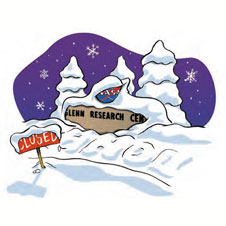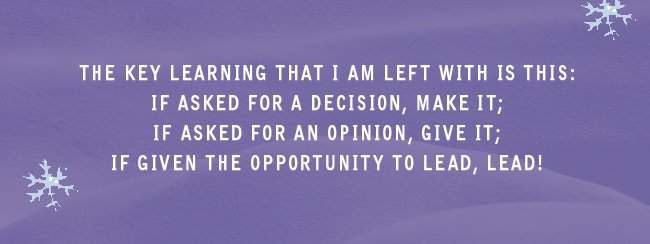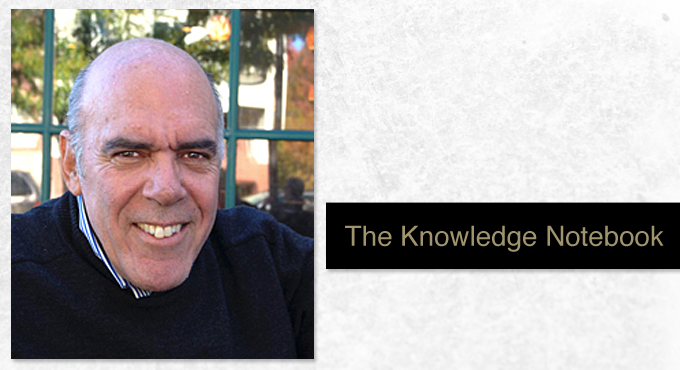By Harvey Schabes
‘Twas the night before the night before the night before Christmas, a cold and snowy night. 
The call came in at approximately 4:30 in the morning. The information was provided. I asked for the caller’s recommendation, and I made the decision, a decision that has haunted me ever since. Did I do the right thing? Would I do it again?
In November 2004, I was named the deputy director of the Center Operations Directorate at Glenn Research Center. It was my first position at this level of management and responsibility. As a rookie, I tried to learn as much as I could from those around me. I consider myself a reflective learner, always asking why, what, and how so as to learn and benefit from each situation and experience and be better for it in the future.
Which brings us to December 22.
As the holiday season neared, many people at Glenn began to take time off, so temporary assignments and acting positions were common. When the director of Center Operations talked to me that day, he informed me that he was leaving for the remainder of the holiday season and that I should do what was necessary to keep things moving. He also said that, since he was going to be out of town, the center’s Emergency Preparedness coordinator would call me for any required action if there were any emergencies. He mentioned as well that the center director, his deputy, and the associate director were also going to be on leave the next day. As the afternoon drew to a close, the weather people in the Cleveland area were predicting snow, but their predictions frequently don’t come to pass. In any event, I went about my normal activities and went home and to bed that night not really concerned that I would be required to do anything special.
But at 4:30 a.m. on Thursday, December 23, my cell phone rang. It was the center’s Emergency Preparedness coordinator. He informed me that many local highways were impassable, none of the center’s roads or parking lots had been plowed (many of the people who would have normally performed this function weren’t able to get in to work), and the police were advising against travel. He recommended that the center be closed for the day. I asked some questions about snowfall amounts and locations across the city and what was being predicted for the next few hours and then said, “Yes”—do what is necessary to close the center and notify the appropriate authorities.
After hanging up, I lay there wondering, what have I done? I just closed the center! I quickly turned on the TV and was somewhat reassured by news reports about the severity of the storm, but all I kept wondering was, what have I done? At about 8:00 in the morning I called the associate director and told him what had happened. He assured me I did the right thing. We would talk several times throughout the day, eventually deciding that the snow had subsided and the roads improved enough to open the center for second-shift operations.
When I came to work on Monday, December 27, the deputy center director wanted to know who the hell shut down the center. He had decided to come to work that Thursday. After driving through bad weather that tripled his commute time, he got to Glenn only to be told by security that the center was closed. I raised my hand and sheepishly said, “I did.” A week later, I went in to the center director’s office and said with a smile on my face, “Forgive me; I am the guy who shut your center.”
He smiled and said, “You did the right thing!”
Word spread quickly; I was given a new title: the “guy who shut the center.” Even today, six years later, whenever snowflakes begin to fall, people still say, “Hey, Harvey, are you going to shut the center again?”

Over the years, I have reflected on that phone call and my decision. I always come to the same conclusion: I would do it again. I also have tried to understand what lessons from that experience I can apply to future situations. The key learning that I am left with is this: if asked for a decision, make it; if asked for an opinion, give it; if given the opportunity to lead, lead!
A leadership lesson I received early in my career also comes to mind. It was taught to me by John Hodge, a space visionary and great leader whom I was exposed to in the early days of space station. I was lucky to have known and learned from him. One of the things he told me was, “Ask for forgiveness, not for permission.” At the time, I wasn’t sure what that meant or when I would apply it, but in fact I have used it many times and in many situations. I am not so confident in my abilities or my opinion that I don’t have doubts or allow others to question or challenge me, but when faced with that critical moment when I have to step up or step aside and wait for “permission,” I remember John’s words. I give it my best shot and live with the consequences.
I have also never shied away from answering a question, even if the answer is, “I don’t know.” As I reflect (something else John Hodge and others have instilled in me as a virtue) on why I act this way, I recognize that it is essential to me that I share what I know, realize what I don’t know, and learn from all situations. Knowledge can be viewed as power, but the truly powerful share their knowledge with others. There is so much that each person brings to a team or life situation; it is incumbent on each of us to share what we know and learn from what others know.
I also believe that the deputy center director who wanted to know who the hell had closed the center ultimately came to view me in a different light—as someone willing to take responsibility and be accountable for his actions and, therefore, as a capable manager with great potential. While I am not today in a position likely to give me even temporary authority to shut a NASA center, I still try to follow the same maxim: if asked, answer; if leadership is needed, lead.
About the Author
 |
Harvey Schabes is the operations integration manager for the Engineering Directorate at Glenn Research Center. He has been at NASA for more than twenty-seven years and has served as a researcher, project engineer, project manager, and manager in both technical and administrative organizations. |







